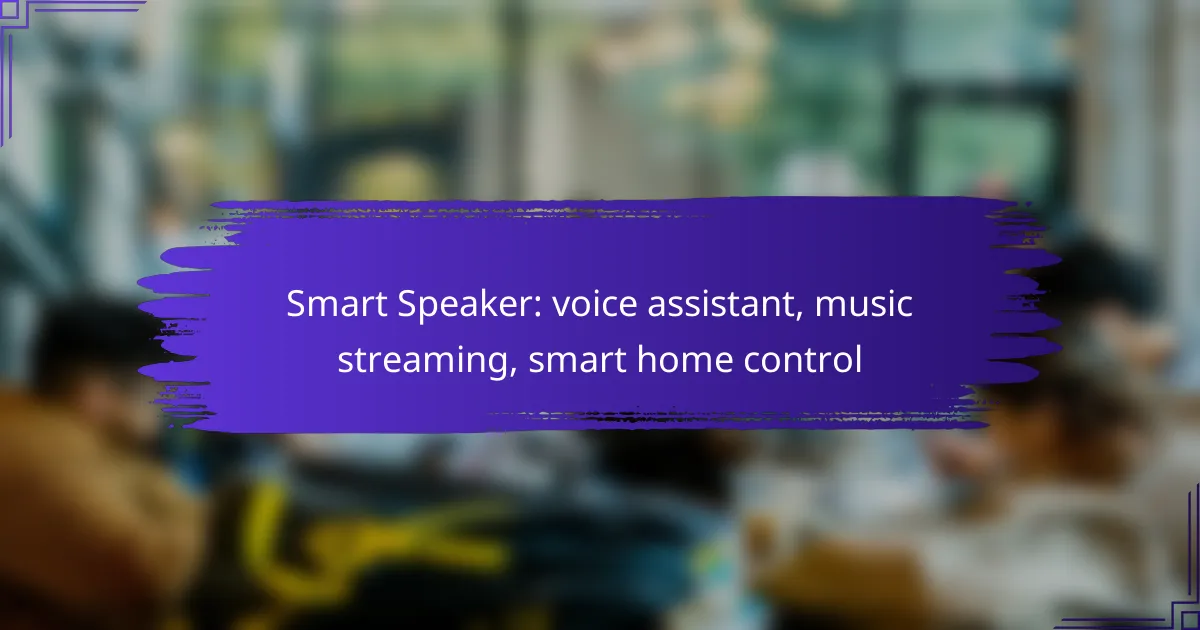Smart speakers are revolutionizing the way we interact with technology by combining voice assistant capabilities with music streaming and smart home control. These devices enable users to effortlessly manage their environment, access a wide range of music services, and enjoy personalized interactions through simple voice commands. With seamless integration into smart home systems, smart speakers serve as a central hub for automation, enhancing convenience and entertainment in everyday life.

How do smart speakers enhance voice assistant capabilities in Canada?
Smart speakers significantly enhance voice assistant capabilities in Canada by providing seamless integration with various smart home devices, music streaming services, and personalized voice interactions. These devices allow users to control their environment, access information, and enjoy entertainment through simple voice commands.
Amazon Echo with Alexa
The Amazon Echo, powered by Alexa, is a versatile smart speaker that excels in voice recognition and smart home integration. Users can control compatible devices, such as lights and thermostats, with voice commands, creating a cohesive smart home experience.
In Canada, Alexa supports various local services, enabling users to stream music from platforms like Amazon Music and Spotify. Additionally, Alexa can provide weather updates, news briefings, and even local restaurant recommendations, making it a valuable assistant for daily life.
Google Nest Hub with Google Assistant
The Google Nest Hub utilizes Google Assistant to deliver a robust smart speaker experience, focusing on voice search and multimedia capabilities. Users can ask questions, control smart devices, and manage schedules through voice commands, benefiting from Google’s extensive search engine capabilities.
In Canada, the Nest Hub supports popular streaming services and integrates with Google services, such as Google Calendar and Google Photos. This integration allows users to display photos, manage events, and access information quickly, enhancing the overall functionality of the device.
Apple HomePod with Siri
The Apple HomePod, featuring Siri, is designed for users deeply integrated into the Apple ecosystem. It offers high-quality audio and smart home control, allowing users to manage HomeKit-enabled devices through voice commands.
In Canada, the HomePod provides access to Apple Music and supports various audio formats, ensuring an immersive listening experience. Users can also use Siri to send messages, set reminders, and control their smart home, making it a practical choice for Apple enthusiasts.
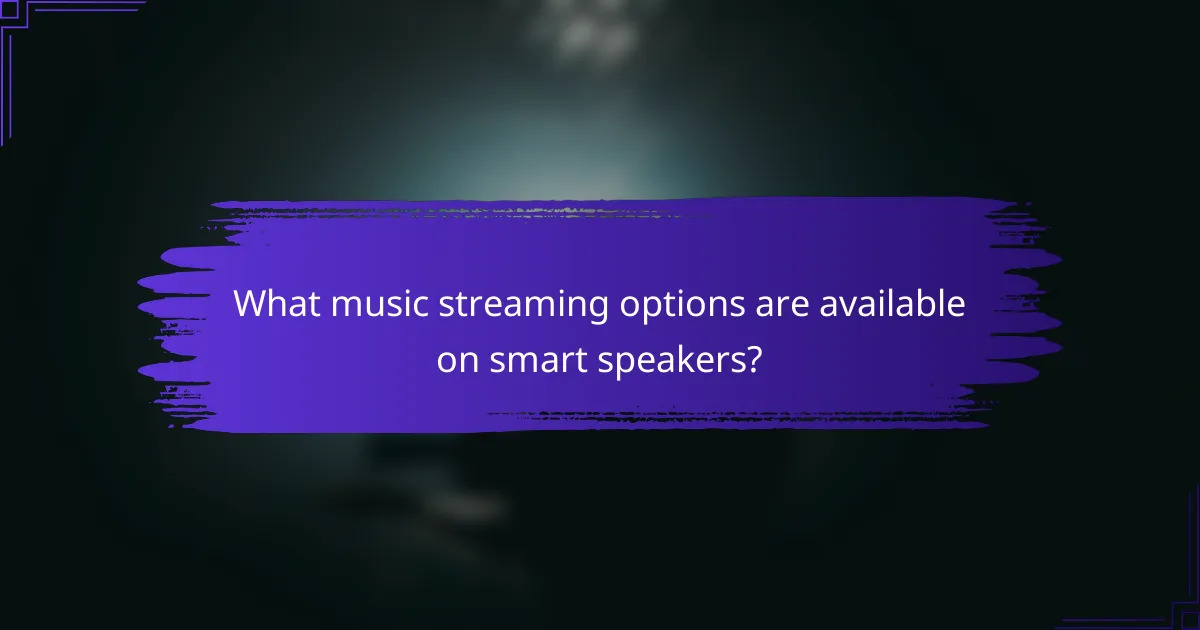
What music streaming options are available on smart speakers?
Smart speakers offer a variety of music streaming options, allowing users to access their favorite songs and playlists easily. Popular services like Spotify, Apple Music, and Amazon Music are commonly integrated, providing diverse choices for music lovers.
Spotify integration
Spotify integration on smart speakers enables users to stream millions of songs and curated playlists using voice commands. Simply link your Spotify account through the smart speaker’s app, and you can ask the assistant to play specific tracks, albums, or playlists.
Consider that Spotify offers both free and premium subscription tiers. The free version includes ads, while the premium option provides an ad-free experience and offline listening capabilities. If you frequently use Spotify, upgrading to premium may enhance your listening experience.
Apple Music compatibility
Apple Music is compatible with many smart speakers, allowing users to access their music library and playlists seamlessly. To use Apple Music, link your account in the smart speaker’s app and use voice commands to play songs or control playback.
Apple Music requires a subscription, but it offers a free trial for new users. This service is particularly beneficial for those already invested in the Apple ecosystem, as it integrates well with other Apple devices and services.
Amazon Music support
Amazon Music is widely supported on smart speakers, especially those from Amazon, like the Echo series. Users can access a vast library of songs, playlists, and stations by linking their Amazon Music account and using voice commands to control playback.
Amazon Music offers several tiers, including a free version with limited access, a Prime Music option for Amazon Prime members, and Amazon Music Unlimited for a broader selection. Choosing the right tier depends on your music consumption habits and whether you are already a Prime member.
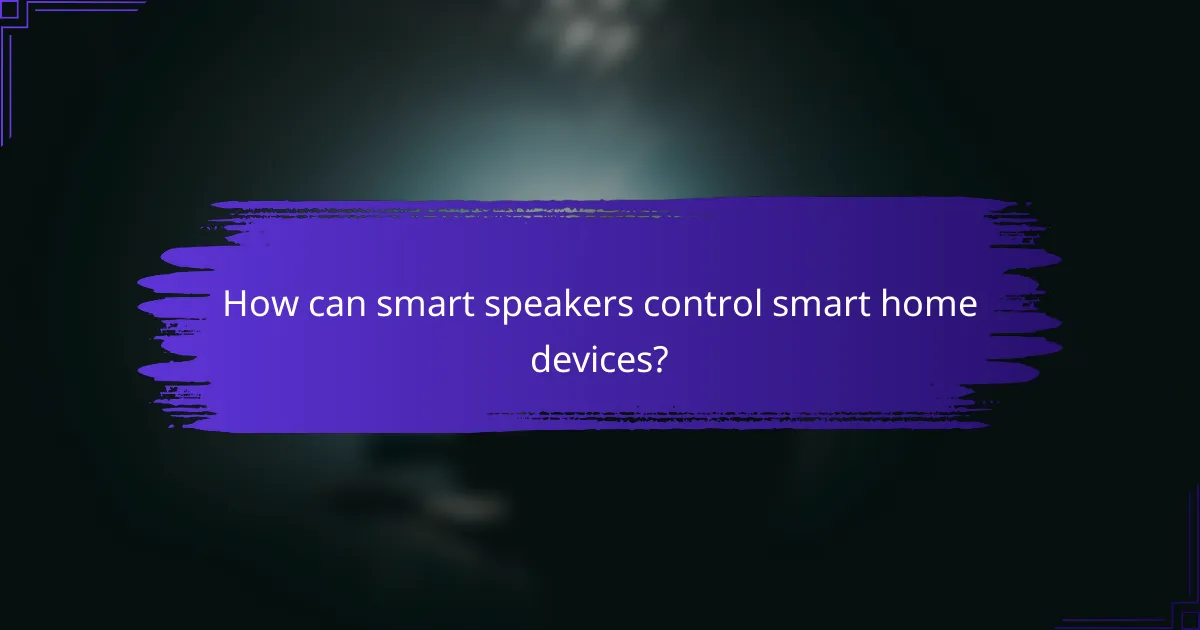
How can smart speakers control smart home devices?
Smart speakers can control smart home devices through voice commands, allowing users to manage various functions like lighting, temperature, and security systems easily. By integrating with compatible smart devices, these speakers act as a central hub for home automation.
Philips Hue lighting control
Smart speakers can seamlessly control Philips Hue lighting systems, enabling users to adjust brightness, change colors, and set schedules using voice commands. For example, saying “Turn on the living room lights” or “Set the bedroom lights to blue” will execute the desired action instantly.
To get started, ensure your Philips Hue lights are connected to the same Wi-Fi network as your smart speaker. You may need to link your Philips Hue account through the smart speaker’s app for full functionality.
Smart thermostat management
With smart speakers, users can easily manage their smart thermostats by issuing commands like “Set the thermostat to 72 degrees” or “Increase the temperature by 2 degrees.” This functionality helps maintain comfort while optimizing energy usage.
When selecting a smart thermostat, look for compatibility with your smart speaker. Popular options include Nest and Ecobee, which offer voice control features and energy-saving settings. Regularly check for software updates to ensure smooth operation.
Smart security system integration
Smart speakers can integrate with various smart security systems, allowing users to monitor their homes and control security features through voice commands. For instance, you can say “Lock the front door” or “Show me the security camera feed” to enhance home security effortlessly.
To ensure compatibility, choose a smart security system that works well with your smart speaker, such as Ring or Arlo. Be mindful of privacy settings and regularly review access permissions to maintain security integrity.
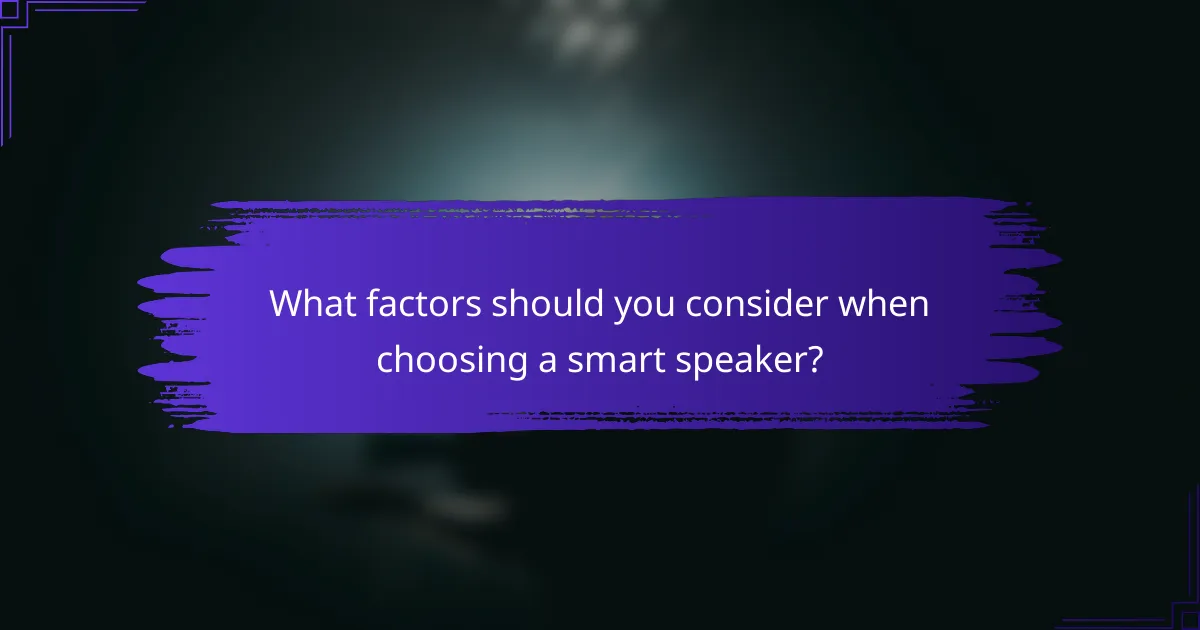
What factors should you consider when choosing a smart speaker?
When selecting a smart speaker, consider audio quality, voice assistant compatibility, and integration with your smart home ecosystem. These factors will significantly influence your user experience and the device’s overall functionality.
Audio quality
Audio quality is crucial for an enjoyable listening experience. Look for speakers that offer clear sound, good bass response, and minimal distortion. Many models provide specifications like frequency response and wattage, which can help gauge performance.
Consider testing speakers in-store if possible, or check reviews that focus on sound quality. Generally, higher-priced models tend to deliver better audio, but there are budget-friendly options that still perform well.
Voice assistant compatibility
Voice assistant compatibility determines how well the smart speaker can interact with your devices and services. Popular options include Amazon Alexa, Google Assistant, and Apple Siri. Ensure the speaker you choose supports the voice assistant you prefer.
Some speakers may offer multiple voice assistants, providing flexibility. However, keep in mind that certain features may be limited based on the assistant you choose, so check compatibility with your existing devices and services.
Smart home ecosystem
The smart home ecosystem refers to how well the speaker integrates with other smart devices in your home. If you have smart lights, thermostats, or security systems, ensure the speaker can control them seamlessly. Compatibility with platforms like Zigbee or Z-Wave can enhance functionality.
Research which devices are compatible with the smart speaker you are considering. A well-integrated ecosystem can simplify your smart home management, making it easier to control multiple devices with voice commands.
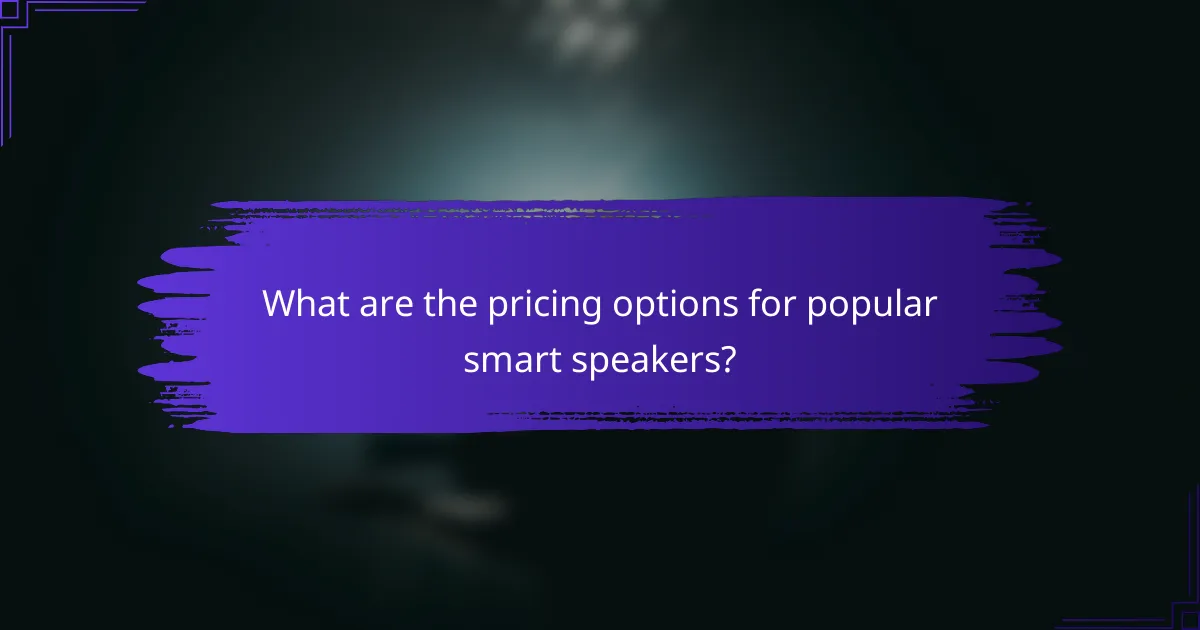
What are the pricing options for popular smart speakers?
Smart speakers vary widely in price, typically ranging from around $25 to $400, depending on features and brand. When choosing a smart speaker, consider not only the initial cost but also the ecosystem it supports and any additional services that may incur fees.
Amazon Echo pricing
The Amazon Echo lineup offers several models, with prices generally starting at about $25 for the Echo Dot and going up to around $200 for the Echo Studio. The Echo Show, which includes a display, ranges from approximately $80 to $250, depending on the screen size and features.
When selecting an Amazon Echo, consider the audio quality and smart home compatibility. The Echo Dot is great for basic tasks and voice control, while the Echo Studio provides superior sound for music streaming.
Google Nest pricing
Google Nest speakers start at around $50 for the Nest Mini and can go up to about $300 for the Nest Audio and Nest Hub Max. The pricing reflects the speaker’s capabilities, with higher-end models offering better sound quality and additional functionalities like video streaming.
Choosing a Google Nest speaker involves evaluating how well it integrates with your existing Google services and smart home devices. The Nest Mini is suitable for casual users, while the Nest Hub Max is ideal for those who want a more interactive experience.
Apple HomePod pricing
The Apple HomePod mini is priced around $100, while the larger HomePod is typically available for about $300. The HomePod mini offers a compact design and good sound quality, making it a popular choice for Apple users.
When considering an Apple HomePod, think about its compatibility with your Apple devices and services. The HomePod excels in music streaming and smart home control within the Apple ecosystem, but it may not offer as much flexibility with third-party services compared to other brands.
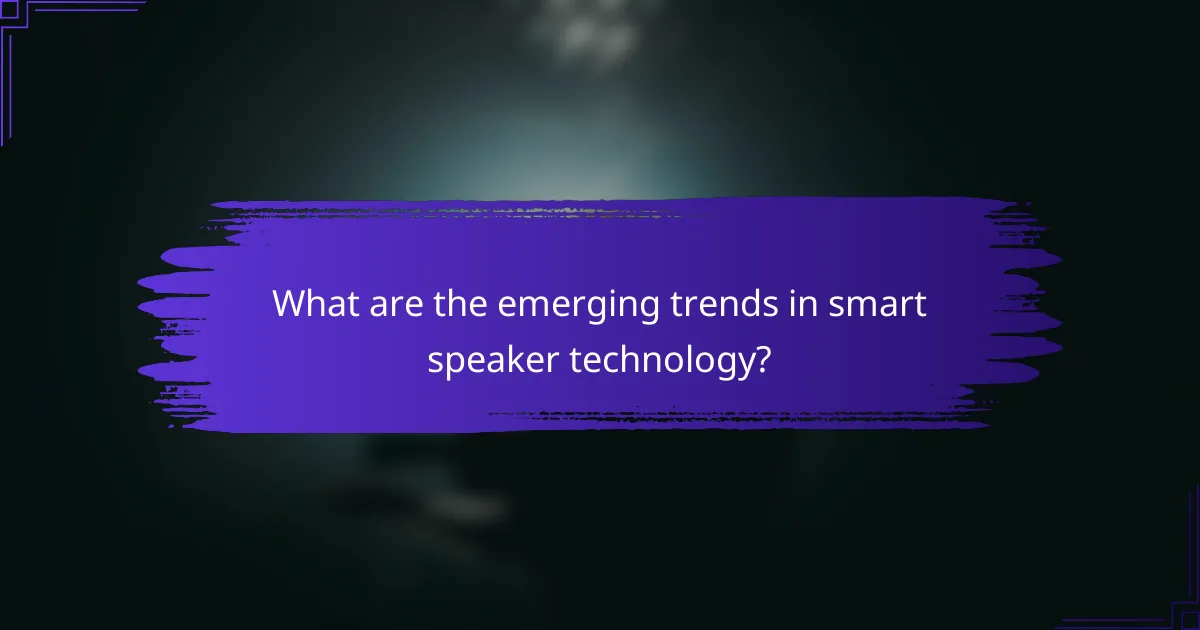
What are the emerging trends in smart speaker technology?
Emerging trends in smart speaker technology focus on enhanced voice recognition, improved integration with smart home devices, and advanced music streaming capabilities. These developments aim to create a more seamless user experience and expand the functionality of smart speakers in everyday life.
Voice Assistant Improvements
Voice assistants are becoming more sophisticated, with better natural language processing and contextual understanding. This means they can handle more complex queries and provide more accurate responses, making interactions feel more intuitive.
For example, newer models can recognize different voices, allowing for personalized responses based on the user. This feature enhances user engagement and makes the device more useful in a multi-user household.
Music Streaming Enhancements
Smart speakers are increasingly integrating with various music streaming services, offering users a wider selection of content. Many devices now support high-resolution audio formats, improving sound quality significantly.
Additionally, features like multi-room audio and personalized playlists based on listening habits are becoming standard. Users can easily control their music experience through voice commands, making it more convenient to enjoy their favorite tunes.
Smart Home Control Integration
Smart speakers are evolving into central hubs for smart home control, allowing users to manage multiple devices from a single point. Compatibility with various smart home ecosystems, such as Zigbee and Z-Wave, is improving, enabling seamless integration.
Users can control lighting, thermostats, and security systems through voice commands. This trend not only simplifies home management but also enhances energy efficiency and security, making smart speakers a valuable addition to modern homes.
